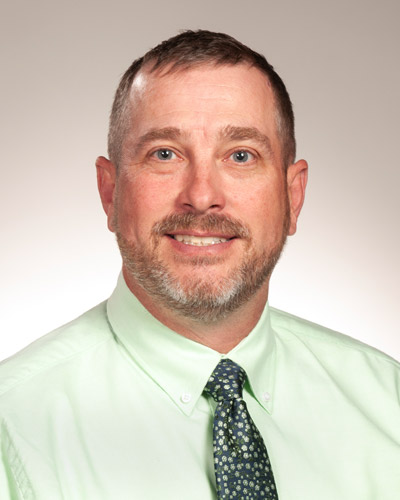Get to Know: Patrick Wolf, MBA
Chief Occupational and Environmental Safety Officer
July 21, 2021Patrick Wolf, MBA, joined PCOM in 2019 and serves as the College's chief environmental
and occupational safety officer. Read on to learn more about Patrick Wolf and his
work at PCOM, particularly his pivotal role in protecting and preparing PCOM throughout
the COVID-19 pandemic.
What is your role at PCOM?
My official title is the Chief Environmental and Occupational Safety Officer. That
is a lot of syllables for a position that tries to ensure that you go home with all
of the fingers and toes you showed up to work with. My position is responsible for
putting programs in place to ensure that the work that is conducted on campus is able
to be conducted safely and that we minimize the impact of our activities on the environment.
Please share a brief background of your professional career including details of previous
positions at PCOM.
After serving almost five years in the United States Army, I worked at the University
of Maryland, Baltimore in the Environmental Health and Safety office for 25 years.
UMB is very similar to PCOM in that it is a health and human services professional school with a medical school, pharmacy school, a physical therapy program as well as a graduate school in its academic offerings. While at UMB, I was responsible
for environmental health, occupation safety, radiation safety, and fire and life safety
programs.
What are some of the challenges you see in your role? How do you plan to face those
challenges?
The biggest challenge in any safety program is ensuring that employees and students
consider the possibility of an accident or injury before they conduct their work.
Most safety regulations address the physical conditions that could create hazards
but not the human behaviors that result in most of the injuries. Promoting safe work
practices is dependent upon being present and engaged so that complacency doesn’t
develop in the familiar and ensuring that everyone feels that PCOM has an environment
where safety concerns can be voiced.
How has the last year and the COVID-19 pandemic impacted your role?
Pivot! Pivot! The pandemic occupied the majority of my time during the last year.
Whether it involved ensuring everyone had the needed PPE or tracking the #CampusClear
submissions and notifications to the covid notice email to make sure that those with
COVID-19 like symptoms or exposures did not come to campus and expose others, the
pandemic was a full-time job. It wasn’t a normal year for any of us but we made it
through due to the hard work of many PCOM employees. That is a testament to the quality
of the staff and faculty at PCOM.
What is your favorite thing about PCOM?
The thing I love most about PCOM is the sense of family you see throughout the campuses. PCOM is really a special place.
What is something people would be surprised to know about you?
I am a pretty open book so I don’t know what would surprise anyone. I still actively
play several sports. I prefer to turn my own wrench when something is broken. I still
don’t have a tattoo. Oh, and I have a long-time desire to be a contestant on the CBS
show Survivor. Outwit. Outplay. Outlast!
About Philadelphia College of Osteopathic Medicine
Established in 1899, Philadelphia College of Osteopathic Medicine (PCOM) has trained
thousands of highly competent, caring physicians, health practitioners and behavioral
scientists who practice a “whole person” approach to care—treating people, not just
symptoms. PCOM, a private, not-for-profit accredited institution of higher education,
operates three campuses (PCOM, PCOM Georgia and PCOM South Georgia) and offers doctoral degrees in clinical psychology, educational psychology, osteopathic
medicine, pharmacy, physical therapy, and school psychology. The college also offers
graduate degrees in applied behavior analysis, applied positive psychology, biomedical
sciences, forensic medicine, medical laboratory science, mental health counseling,
physician assistant studies, and school psychology. PCOM students learn the importance
of health promotion, research, education and service to the community. Through its
community-based Healthcare Centers, PCOM provides care to medically underserved populations.
For more information, visit pcom.edu or call 215-871-6100.
Contact Us
For general media inquiries, please contact the Office of Marketing and Communications
at 215-871-6300 or communications@pcom.edu. Visit our media relations page to view contact information for public relations personnel.
Connect with PCOM


